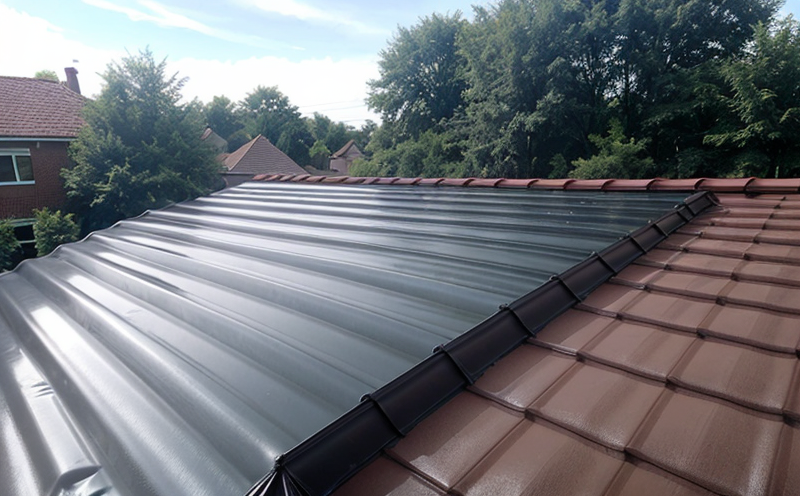ASTM D1970 Self-Adhered Modified Bitumen Roofing Testing
The ASTM D1970 standard provides a robust framework for testing self-adhered modified bitumen (SAB) roofing membranes. These materials are widely used in the construction industry due to their durability and flexibility, particularly in harsh environmental conditions. SAB membranes are designed to adhere directly to flat or low-slope roofs without additional adhesives, making them an attractive option for modern roofing systems.
The testing outlined by ASTM D1970 focuses on evaluating the tensile strength of these materials under specific conditions that simulate real-world stress. This is crucial because it helps ensure that the SAB membrane can withstand the mechanical and environmental forces exerted during construction, use, and exposure to weather elements like wind, rain, and ultraviolet radiation.
Testing according to ASTM D1970 involves preparing specimens in accordance with specified dimensions and conditions. The specimens are then subjected to a tensile test where their ability to withstand stretching without tearing is measured. This process not only assesses the material's mechanical properties but also provides insights into its potential for long-term performance.
Understanding the importance of this test, laboratories specializing in building & infrastructure testing recognize that ASTM D1970 plays a vital role in ensuring product quality and safety. By adhering to these standards, manufacturers can demonstrate compliance with industry best practices and regulatory requirements, thereby enhancing consumer confidence and trust.
The results from such tests are critical for quality managers and R&D engineers as they provide valuable data that can be used to improve formulations, enhance material properties, and ensure consistent product performance. Compliance officers benefit from these tests too because they help in meeting legal and regulatory standards ensuring the materials meet or exceed specified performance criteria.
The testing procedure outlined by ASTM D1970 is a cornerstone for quality assurance within the roofing industry. It ensures that manufacturers deliver products that perform reliably under various conditions, thereby contributing to safer and more sustainable building practices.
Applied Standards
| Standard | Description |
|---|---|
| ASTM D1970-18 | This standard specifies the procedure for determining tensile strength and elongation of self-adhered modified bitumen roofing membranes under specified conditions. |
| ISO 6041:2013 | An international standard that provides additional guidance on testing procedures which complement ASTM D1970. |
Scope and Methodology
| Test Parameters | Description |
|---|---|
| Tensile Strength | The ability of the membrane to withstand stretching without failure, measured in psi. |
| Elongation at Break | The percentage increase in length of the sample before it breaks under tensile stress. |
During ASTM D1970 testing, specimens are cut from commercially available self-adhered modified bitumen roofing membranes. These specimens must adhere to a specified backing strip or an appropriate support surface. The test setup involves clamping the specimen between two grips that apply tension until failure occurs.
The methodology includes precise control over environmental conditions such as temperature and humidity, which can affect the performance of the membrane. Specimens are often conditioned for at least 24 hours in a controlled environment before testing to ensure accurate results.
Post-test analysis involves examining both the tensile strength and elongation data. These metrics provide critical information about the material's capacity to withstand mechanical stress, which is essential for understanding its suitability for specific roofing applications.
Quality and Reliability Assurance
The quality of ASTM D1970 testing is paramount in ensuring reliable results that reflect the true performance characteristics of self-adhered modified bitumen membranes. Laboratories employ rigorous calibration procedures for all test equipment to guarantee accuracy.
Laboratory personnel undergo extensive training and certification to ensure they understand both the technical aspects of ASTM D1970 and its practical applications in real-world scenarios. This expertise is crucial for interpreting results correctly and providing actionable insights to stakeholders.
Quality control measures are also implemented throughout the testing process, including regular audits of test protocols and equipment maintenance schedules. These practices help maintain consistency across tests and minimize variability that could lead to inaccurate conclusions.
In addition to internal controls, laboratories often collaborate with industry partners and regulatory bodies to stay updated on emerging trends and best practices in roofing material testing. This collaboration ensures that the laboratory remains a leader in providing accurate, relevant data for the building & infrastructure sector.





